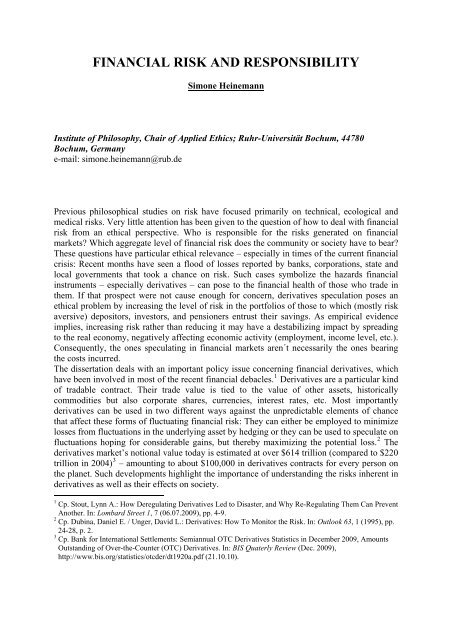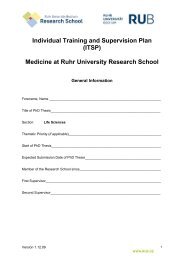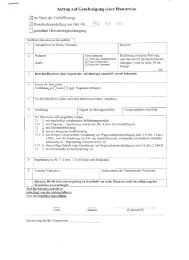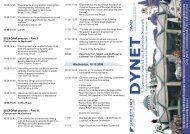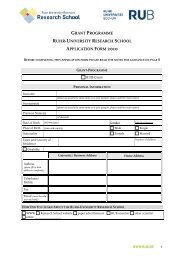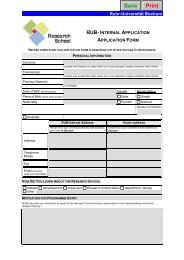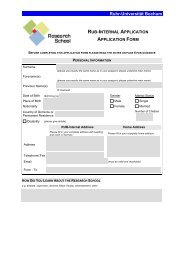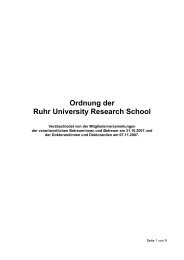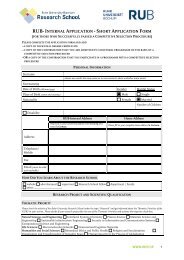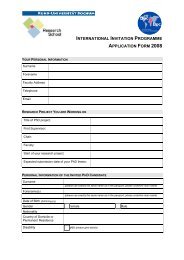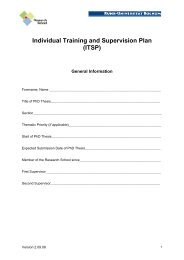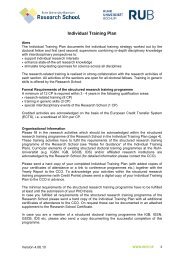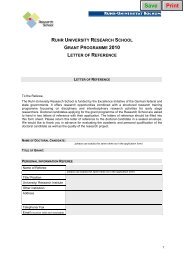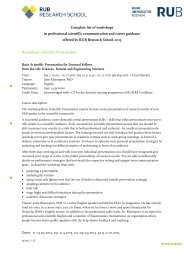Section Days abstract book 2010.indd - RUB Research School ...
Section Days abstract book 2010.indd - RUB Research School ...
Section Days abstract book 2010.indd - RUB Research School ...
You also want an ePaper? Increase the reach of your titles
YUMPU automatically turns print PDFs into web optimized ePapers that Google loves.
FINANCIAL RISK AND RESPONSIBILITY<br />
Simone Heinemann<br />
Institute of Philosophy, Chair of Applied Ethics; Ruhr-Universität Bochum, 44780<br />
Bochum, Germany<br />
e-mail: simone.heinemann@rub.de<br />
Previous philosophical studies on risk have focused primarily on technical, ecological and<br />
medical risks. Very little attention has been given to the question of how to deal with financial<br />
risk from an ethical perspective. Who is responsible for the risks generated on financial<br />
markets? Which aggregate level of financial risk does the community or society have to bear?<br />
These questions have particular ethical relevance – especially in times of the current financial<br />
crisis: Recent months have seen a flood of losses reported by banks, corporations, state and<br />
local governments that took a chance on risk. Such cases symbolize the hazards financial<br />
instruments – especially derivatives – can pose to the financial health of those who trade in<br />
them. If that prospect were not cause enough for concern, derivatives speculation poses an<br />
ethical problem by increasing the level of risk in the portfolios of those to which (mostly risk<br />
aversive) depositors, investors, and pensioners entrust their savings. As empirical evidence<br />
implies, increasing risk rather than reducing it may have a destabilizing impact by spreading<br />
to the real economy, negatively affecting economic activity (employment, income level, etc.).<br />
Consequently, the ones speculating in financial markets aren´t necessarily the ones bearing<br />
the costs incurred.<br />
The dissertation deals with an important policy issue concerning financial derivatives, which<br />
have been involved in most of the recent financial debacles. 1 Derivatives are a particular kind<br />
of tradable contract. Their trade value is tied to the value of other assets, historically<br />
commodities but also corporate shares, currencies, interest rates, etc. Most importantly<br />
derivatives can be used in two different ways against the unpredictable elements of chance<br />
that affect these forms of fluctuating financial risk: They can either be employed to minimize<br />
losses from fluctuations in the underlying asset by hedging or they can be used to speculate on<br />
fluctuations hoping for considerable gains, but thereby maximizing the potential loss. 2 The<br />
derivatives market’s notional value today is estimated at over $614 trillion (compared to $220<br />
trillion in 2004) 3 – amounting to about $100,000 in derivatives contracts for every person on<br />
the planet. Such developments highlight the importance of understanding the risks inherent in<br />
derivatives as well as their effects on society.<br />
1<br />
Cp. Stout, Lynn A.: How Deregulating Derivatives Led to Disaster, and Why Re-Regulating Them Can Prevent<br />
Another. In: Lombard Street 1, 7 (06.07.2009), pp. 4-9.<br />
2<br />
Cp. Dubina, Daniel E. / Unger, David L.: Derivatives: How To Monitor the Risk. In: Outlook 63, 1 (1995), pp.<br />
24-28, p. 2.<br />
3<br />
Cp. Bank for International Settlements: Semiannual OTC Derivatives Statistics in December 2009, Amounts<br />
Outstanding of Over-the-Counter (OTC) Derivatives. In: BIS Quaterly Review (Dec. 2009),<br />
http://www.bis.org/statistics/otcder/dt1920a.pdf (21.10.10).


